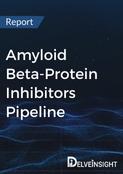Amyloid Beta-Protein Inhibitors Pipeline
DelveInsight’s, “Amyloid Beta-Protein Inhibitors– Pipeline Insight, 2025,” report provides comprehensive insights about 10+ companies and 10+ pipeline drugs in Amyloid Beta-Protein Inhibitors pipeline landscape. It covers the pipeline drug profiles, including clinical and nonclinical stage products. It also covers the therapeutics assessment by product type, stage, route of administration, and molecule type. It further highlights the inactive pipeline products in this space.
Geography Covered
- Global coverage
Amyloid Beta-Protein Inhibitors Understanding
Amyloid Beta-Protein Inhibitors: Overview
Amyloid-β (Aβ) denotes peptides of 36–43 amino acids that are crucially involved in Alzheimer's disease as the main component of theamyloid plaques found in the brains of Alzheimer patients. The peptides result from the amyloid precursor protein (APP), which is being cut by certain enzymes to yield Aβ. Amyloid-β molecules can aggregate to form flexible soluble oligomers which may exist in several forms. Amyloid-β peptide is due to overproduction of Aβ and/or the failure of clearance mechanisms. Amyloid-β self-aggregates into oligomers, which can be of various sizes, and forms diffuse and neuritic plaques in the parenchyma and blood vessels.
Function – The progressive production and subsequent accumulation of β-amyloid (Aβ), a proteolytic fragment of the membrane-associated amyloid precursor protein (APP), plays a central role in Alzheimer's disease (AD). Aβ is released in a soluble form that may be responsible for cognitive dysfunction in the early stages of the disease, then progressively forms oligomeric, multimeric and fibrillar aggregates, triggering neurodegeneration. Eventually, the aggregation and accumulation of Aβ culminates with the formation of extracellular plaques, one of the morphological hallmarks of the disease, detectable post-mortem in AD brains.
Amyloid Beta-Protein Inhibitors- Inhibition of the formation of these toxic polymers of Aβ has thus emerged as an approach to developing therapeutics for AD. Therefore, blocking the initial stages of Aβ peptide aggregation with small molecules could hold considerable promise as the starting point for the development of new therapies for AD.
Report Highlights
- The companies and academics are working to assess challenges and seek opportunities that could influence Amyloid Beta-Protein Inhibitors R&D.
- The therapies under development are focused on novel approaches for Amyloid Beta-Protein Inhibitors.
Amyloid Beta-Protein Inhibitors Emerging Drugs Chapters
This segment of the Amyloid Beta-Protein Inhibitors report encloses its detailed analysis of various drugs in different stages of clinical development, including phase III, II, I, preclinical and Discovery. It also helps to understand clinical trial details, expressive pharmacological action, agreements and collaborations, and the latest news and press releases.
Amyloid Beta-Protein Inhibitors Emerging Drugs
Aducanumab: Biogen
Biogen’s aducanumab — a monoclonal antibody is currently under review by the U.S. Food and Drug Administration. If ultimately approved, it is predicted that the drug, which only showed modest efficacy in phase III clinical trial, could become the best-selling drug of all time.
Crenezumab: Hoffman-La-Roche
Crenezumab (RG7412) is a humanized monoclonal antibody, which binds to amyloid beta (Abeta). Abeta is the main constituent of amyloid plaque in the brains of patients with Alzheimer's disease and is proposed to be causative in the development of the disease. A phase II clinical trial is evaluating Crenezumab in healthy individuals with a history of familial Alzheimer’s disease. Roche plans to submit regulatory applications for marketing Crenezumab for Alzheimer's disease by 2023.
Further product details are provided in the report……..
Amyloid Beta-Protein Inhibitors: Therapeutic Assessment
This segment of the report provides insights about the different Amyloid Beta-Protein Inhibitors drugs segregated based on following parameters that define the scope of the report, such as:
- Major Players working on Amyloid Beta-Protein Inhibitors
There are approx. 10+ key companies which are developing the Amyloid Beta-Protein Inhibitors. The companies which have their Amyloid Beta-Protein Inhibitors drug candidates in the most advanced stage, i.e. preregistration include Biogen.
Phases
DelveInsight’s report covers around 10+ products under different phases of clinical development like
- Late-stage products (Phase III )
- Mid-stage products (Phase II )
- Early-stage products (Phase I/II and Phase I) along with the details of
- Pre-clinical and Discovery stage candidates
- Discontinued & Inactive candidates
- Route of Administration
Amyloid Beta-Protein Inhibitors pipeline report provides the therapeutic assessment of the pipeline drugs by the Route of Administration. Products have been categorized under various ROAs such as
- Infusion
- Intravenous
- Intramuscular
- Oral
- Parenteral
- Subcutaneous
- Molecule Type
Products have been categorized under various Molecule types such as
- Vaccines
- Monoclonal Antibody
- Peptides
- Polymer
- Small molecule
- Product Type
Drugs have been categorized under various product types like Mono, Combination and Mono/Combination.
Amyloid Beta-Protein Inhibitors: Pipeline Development Activities
The report provides insights into different therapeutic candidates in phase II, I, preclinical and discovery stage. It also analyses Amyloid Beta-Protein Inhibitors therapeutic drugs key players involved in developing key drugs.
Pipeline Development Activities
The report covers the detailed information of collaborations, acquisition and merger, licensing along with a thorough therapeutic assessment of emerging Amyloid Beta-Protein Inhibitors drugs.
Amyloid Beta-Protein Inhibitors Report Insights
- Amyloid Beta-Protein Inhibitors Pipeline Analysis
- Therapeutic Assessment
- Unmet Needs
- Impact of Drugs
Amyloid Beta-Protein Inhibitors Report Assessment
- Pipeline Product Profiles
- Therapeutic Assessment
- Pipeline Assessment
- Inactive drugs assessment
- Unmet Needs
Key Questions
Current Scenario and Emerging Therapies:
- How many companies are developing Amyloid Beta-Protein Inhibitors drugs?
- How many Amyloid Beta-Protein Inhibitors drugs are developed by each company?
- How many emerging drugs are in mid-stage, and late-stage of development for Amyloid Beta-Protein Inhibitors?
- What are the key collaborations (Industry–Industry, Industry–Academia), Mergers and acquisitions, licensing activities related to the Amyloid Beta-Protein Inhibitors therapeutics?
- What are the recent trends, drug types and novel technologies developed to overcome the limitation of existing therapies?
- What are the clinical studies going on for Amyloid Beta-Protein Inhibitors and their status?
- What are the key designations that have been granted to the emerging drugs?

